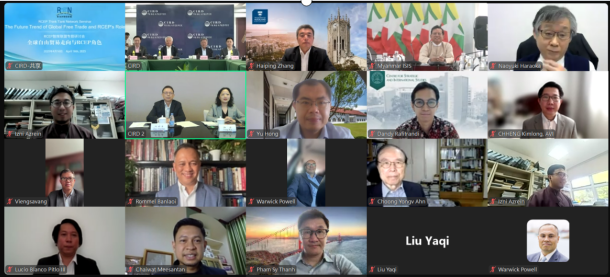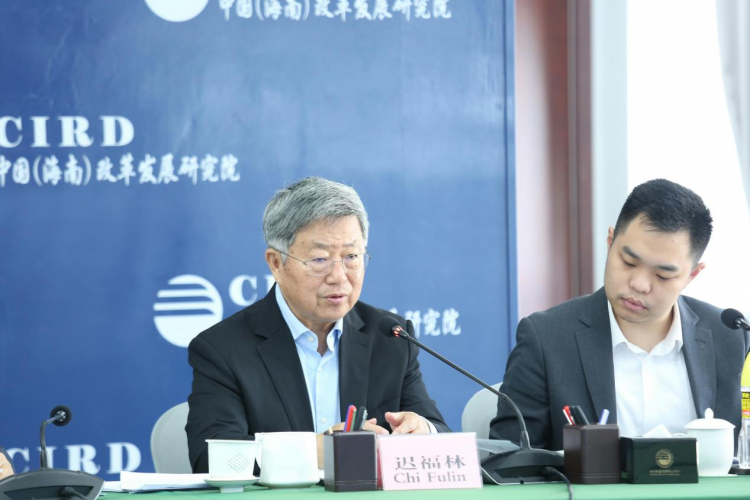RCEP Think Tank Network Hosts Seminar on “The Future Trend of Global Free Trade and RCEP’s Role”
On the morning of April 16, 2025, the RCEP Think Tank Network convened a thematic seminar titled “The Future Trend of Global Free Trade and RCEP’s Role” in a hybrid format. Experts, scholars, and members of the RCEPTTN from all 15 RCEP member countries participated in in-depth discussions on key topics such as RCEP’s role in promoting free trade, advancing regional free trade arrangements with a focus on Asia, and addressing the challenges, opportunities, and pragmatic strategies facing the RCEP. The seminar was moderated by Zhou Shuchun, Executive Deputy Director of China Foundation for Human Rights Development.

The event was structured in two parts: opening remarks and expert discussions. Professor Chi Fulin, President of China Institute for Reform and Development (CIRD) and Hainan Institute for Free Trade Port Studies (HIFTPS), emphasized in his keynote speech, at present, against the backdrop of the U.S. challenging the global free trade order with its “tariff stick”, free trade is a vital driver for stimulating market vitality and fostering economic growth. Free trade based on open markets and inclusive rules is RCEP’s greatest strength. Steadfastly advancing RCEP with free trade at its core serves as a key lever to promote regional economic integration and counter the U.S. trade war. Professor Chi put forward three proposals: First, jointly building the largest, most equitable, and most dynamic free trade area; Second, RCEP is well-positioned to become a key driver of global free trade; Third, jointly building RCEP to a higher-level.

During the discussion session, 16 experts and scholars from across RCEP region shared their insights. These included: Naoyuki Haraoka, Executive Managing Director of Japan Economic Foundation; Ahn Choong Yong, Distinguished Professor of Graduate School of International Studies at Chung-Ang University, Korea; Dandy Rafitrandi, Researcher of Centre for Strategic and International Studies, Indonesia; Wu Shicun, Chairman of Huayang Center for Maritime Cooperation and Ocean Governance; Rommel Banlaoi, President of Philippine Society for International Security Studies; Chheng Kimlong, President of Asian Vision Institute, Cambodia; Ong Chongyi, Executive Director of Belt and Road Initiative Caucus for Asia Pacific, Malaysia; Chaiwat Messanthan, Director of Institute of East Asian Studies, Thammasat University, Thailand; Yu Hong, Senior Research Fellow of East Asian Institute, National University of Singapore; U Htin Lynn, Executive Board Member of Myanmar Institute of Strategic and International Studies; Viengsavang Thipphavong, Director of Institute for Industry and Commerce, Laos; Warwick Powell, Adjunct Professor at Queensland University of Technology, Australia and Senior Fellow at Taihe Institute; Lucio B. Pitlo III, President of Philippines Association for Chinese Studies; Zhang Haiping, Director of APEC Study Centre at University of Auckland, New Zealand; Pham Sy Thanh, Director of Center for Chinese Economic and Strategic Studies, Vietnam; and Izni Azrein Bin Noor Azalie, Lecturer of Faculty of Arts and Social Sciences, Universiti Brunei Darussalam.
Participating think tank representatives and experts reached a consensus: First: isolation and confrontation lead only to recession and conflict, while openness, cooperation, and mutual benefit are shared aspirations and prevailing trend of the times; Second, RCEP is a crucial strategic response to trade protectionism and a driving force for regional free trade, economic integration, and inclusive, sustainable development among its members; Third, it is imperative to accelerate the regional free trade process, strengthen cooperation between RCEP and non-member economies, and build a partnership network in support of free trade to jointly address protectionism and unilateralism; Fourth, adapting to emerging trends in regional economic and trade development, RCEP’s governance mechanisms must be improved to ensure its upgrade and expansion; Fifth, think tanks across the RCEP region should continue to play an active and constructive role.
The seminar is co-organized by RCEP Research Institute of CIRD. Participants from CIRD included Yang Rui, Executive President of CIRD and President of RCEP Research Institute; Chen Wei, Vice President of CIRD; Kuang Xianming, Vice President of CIRD and RCEP Research Institute, CIRD; Guo Da, Vice President of HIFTPS; Wang Yuehong and Jin Ye, Assistant Researchers of RCEP Research Institute.
 中改院
中改院
 官方微信扫一扫
官方微信扫一扫 官方微信扫一扫
官方微信扫一扫